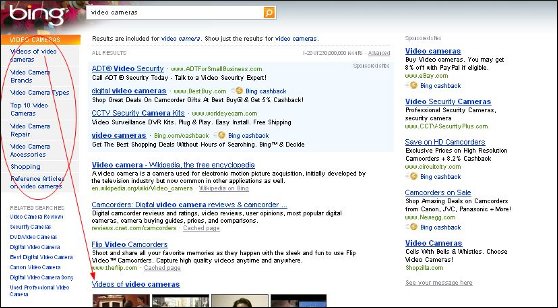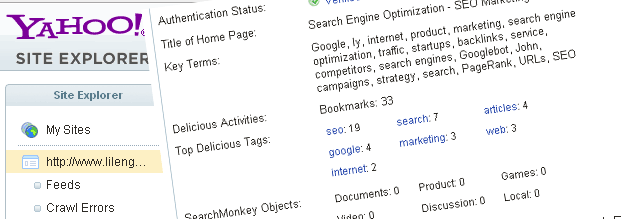According to latest StatCounter data, Goolge has dropped below 90% of search engine market share – for the first time since July 2009. The presented figure of 89.94%, though is still a major headache for its competitors, Yahoo and Bing that combine to just over 8% of global search… In the European market the domination is even greater – Google has about 94% of market share.
Although Bing has surpassed Yahoo globally in January, in the US market Yahoo! is still a number two search engine, with 9.74% share compared to Bing’s 9.03%. Google has dropped below 80% once again, with 79.63%.
In Asia, Baidu has once again beaten Bing for the number three spot (Yahoo! is second). It must be noted however, that StatCounter only considers English searches so the results have to be viewed with care. For example, in Russia Google is reported as the market leader with 52% with Yandex having a figure of 46%, and in Czech Republic the picture looks even brighter for Google, which beats local Seznam 79% to 19%. Of course, when native language searches are considered, both Yandex and Seznam are more popular than Google in their local market.
But even so, in China, Baidu is a clear number one, with almost 70% of the market (compared to Google’s 29%) and in South Korea Naver is back to absolute majority (55.15%), with both Google and recently launched Daum both loosing ground (31.7% and 7.85% respectively).
Ask.com and Bing are very anxious to prove the world they can beat Google. Even in minor things, like Image Search that Bing was enhancing constantly over last several month. Or in a Search Engine Jeopardy contest, managed by Stephen Wolfram. Well, it seems Google competitors still have some work to do, as the Search Industry leader was victorious once again.
The SE Jeopardy consisted of Jeopardy questions randomly selected form a database of around 200000 that were fed into the search queries of various engines. The developers then looked at the number of correct answers that appeared in the search results page and also at the number of correct answers that were included in the page that search engines presented as the top result.
The results were as follows:
Percentage of correct answers appearing somewhere on the first page: Google – 69%; Ask.com – 68%, Bing – 63%, Yandex – 62%, Blekko – 58%, Wikipedia – 23%.
Percentage of correct answers appearing in the top result of the page: Google – 66%; Bing – 65%, Yandex – 58%, Ask.com – 51%, Blekko – 40%, Wikipedia – 29%.
Obviously Wikipedia didn’t stand too much chance, as it was only one website competing against “the whole internet”. Still, it must be noted that only about one-third of Jeopardy answers are already in Wikipedia…
As to Search Engines – Google has beaten the competition, although the margins are not that big. But based on these results, Ask and Blekko have to do a better job of listing the most relevant link at the top (see how their percentage dropped when they looked into the first document. And Bing is “almost there” – but still a fraction behind Google.
Yandex numbers were very impressive, as it is basically a local Russian search engine. If the test has been done in Russian (or at least, based on Russian Jeoprdy Analogue, “Svoya Igra”, which includes fewer questions about American culture and history) Yandex would probably beat Google – exactly as it does in the Russian Search Engine market.
In summary, nobody can beat Google in providing relevant information. Not just yet. So, when you want to know “What is” something – don’t ask and don’t bing. Google it!
Everybody knows that Yahoo US has teamed up with Bing in order to fight Google in the North American search market. In other parts of the world, however, strange things are happening.
Since the start of 2011, Yahoo and Bing are also a joint force in Australia, Mexico and Brazil. In the UK, however, the deal has not been sealed yet. And although people are saying that it is only a matter of time, noticing that certain Yahoo search results look identical to Bing and speculating about “two different indexes”, it is yet to be seen whether Yahoo UK will be powered by Bing in the end. Why not, anyway? Where will Yahoo go? To Google? Well, yes!
Yahoo! Japan, for example, has made a partnership with Google. The deal (Google US will supply the technology for Yahoo! Japan) was recently approved by the FTC (Fair Trade Commission) – a body responsible for preventing monopolization of the markets. And although the ratification is not permanent, and FTC stated they will monitor the activity of the combined team closely, it was a major hit for both Microsoft and local search engines. Yahoo US was not very happy either, but was unable to stop the move, as it only own about 30% of Yahoo! Japan.
Yahoo! had several troubles in the recent years. Geocities was shut down, as were several other features. And with over half a thousand workers fired in the end of 2010, people started asking questions about the future of a former search industry leader (how long ago was that?) and its satellite products.
Flickr, on the other hand, is a popular service, and, contrary to so many other projects and applications launched by Yahoo! and Google, generates certain profit. However, according to some general evaluation, this profit is not so high, to say the least. Thomas Hawk estimated 50 million per year, which is, of course, a tiny income for a corporation of the size of Yahoo. This led to speculations about the possibility of yet another cut by Yahoo! – this time of the beloved photo-sharing service.
Well, do not worry yet, Flickr fans. Those rumors were refuted by both Flickr Cal Henderson (who also commented that the figure of 50M is incorrect, since Flickr makes money via advertising, and not only by selling Pro accounts, as was presented in the Hawk’s estimation) and Blake Irving, Yahoo Product Chief. When asked in a recent twitter chat about Yahoo! commitment to Flickr, Irving enthusiastically tweeted “Hell yes we are!”, mentioning Flickr product and team, its strategy and profitability.
We all know Facebook is one of the fastest (if not THE fastest) growing websites around. The popularity of Facebook is amazing and the number of hours spent by the users on their Facebook pages, playing games, posting and tagging photos is increasing every day.
And here is another indication of the website’s growth: unique visitors. This is a statistic that keeps track of websites (really webpages) being accessed by users based on their IP (which is very similar to physical location). Google is leading the way since very-long-time-ago, with an average of about 1 billion hits a month, and Microsoftis is second, about 100 million unique visitors behind.
According to Geek.com, Yahoo! has been pushed down to fourth place in November 2010, by (guess who?) Facebook, of course. The numbers reported (648 million for FB and just over 630 million for Yahoo!) were supplied by comScore, providing yet another confirmation of Social Media progress towards taking over the internet.

Local search engine listings may be little more than an afterthought to some webmasters, but they are a source of business that you shouldn’t ignore. Optimizing your site for local searches and making sure you’re listed in the local versions of the major search engines is a smart move, and doing so is fairly quick and easy. The three biggies in local search are Google Local, Yahoo! Local, and Bing Local.

The fundamentals of SEO apply regardless of which search engine you want to rank in, but each of the major ones has some finer points, so let’s get right to them.
You may have heard that participating in Google AdWords would penalize your site in other search engines, but Yahoo! insists that this is not the case. They really have nothing to gain by dropping sites that are relevant, and if they did, they’d be cutting off their nose to spite their face. But the age of your domain is important because a longer track record ups a site’s relevancy. It’s only one score, and it’s one you can’t do much about, but it’s something to keep in mind: SEO is a long term idea.
Yahoo! suggests registering domains for more than one year at a time. It gives your site a long-term focus and keeps you from accidentally losing a domain because you didn’t find the email that it was time to renew. They also suggest you should buy the same domain name with and without dashes. This will keep you from losing so-called type-in traffic. However, all SEO pundits say that the more dashes, the harder it is to type in, and the more spam-like it will look, so don’t get carried away.
Like with Google, with Yahoo!, relevant inbound links from high quality pages are gold. This is one of the hardest parts of SEO, but it’s one where there really aren’t many shortcuts. You want links from sites that belong to the same general neighborhood of topics as yours. If you have a site that sells organic flour, a link from a fishing tackle site isn’t going to help you much, if at all. And when it comes to giving out your own links, be careful here as well. If you link to a lot of sites that are or could be penalized, you could be hurting yourself by association. If you sell text links, check out every site that buys from you to make sure you’re not endorsing spam, porn, or other content that search engines frown upon.
Make use of Yahoo Site Explorer to see how many pages are indexed and to track the inbound links to your site. The first screen shot shows the results of the analysis of one site. As you can see, there are 503 pages on the site, and 5,838 inlinks, each of which you can explore further. To maximize crawling of your site and indexing of pages, publishing fresh, high quality content is the key.

There have been some case studies about what Bing looks at compared to Yahoo! and Google when ranking sites. When ranking for a keyword phrase, both Bing and Google look at the title tag 100% of the time. Prominence is given a little more weight with Bing than with Google, while Google favors link density and link prominence more than Bing. Bing evaluates H1 tags, while Google does not, and Google considers meta keywords and description while Bing does not. What that all boils down to with Bing is that having an older domain and having inbound links from sites that include the primary keyword in their title tags (another way of saying relevant inbound links) are keys to optimizing for Bing. Like optimizing for the other major search engines, link building should be a regular, steady part of your SEO effort.
With Bing, it’s easier to compete for broad terms. With Bing, keyword searches result in Quick Tabs that offer variations on the parent keyword. This has the effect of bringing to the surface websites that rank for those keyword combinations. The goal is for content-rich sites to convert better than sites with less relevant content. The multi-threaded SERP design brings up more pages associated with the primary keywords than would come up with a single-thread SERP list. Also, Bing takes away duplicate results from categorized result lists. This allows lower ranked pages to be shown in the categorized results.
The Bing screen shot shows the results for a search on “video cameras.” To the left is a column of subcategories. Results from those subcategories are listed below the main search results. While there are some differences to SEO for Bing, the relatively new search engine isn’t a game changer when it comes to SEO.

It sometimes seems as if SEO is synonymous with “SEO for Google,” since Google is the top search engine. And it also seems that when it comes to SEO for Google, a lot of the conventional wisdom has to do with not displeasing the Google search engine gods by doing things like cloaking, buying links, etc.
The positive steps toward SEO with Google include keywords in content and in tags, good inbound links, good outbound links (to a lesser extent), site age, and top level domain (with .gov, .edu, and .org getting the most props). Negative factors included all-image or Flash content, affiliate sites with little content, keyword stuffing, and stealing content from other sites. It isn’t so much that Google wants to seek out an destroy sites that buy links, but they want the sites with actual relevant, fresh content to have a shot at the top, and with some sites trying to game the system and get there dishonestly, Google has to find a way to deal with these sites without hurting the good sites.
In fact, Google wants users to report sites that are trying to cheat to get to the top of the search engines. On the screen shot, you can see a copy of the form found at https://www.google.com/webmasters/tools/spamreport?pli=1 for reporting deceptive practices. You have to be signed in to your Google account to use this, by the way. They want to get away from anonymous spam reports.

yahoo site explorer
Looking for an alternative to Google Webmaster tools? Yahoo’s site explorer might just be the answer. Yahoo recently announced 2 new features to site explorer which should add even more appeal.
Keyterms are available for individual pages and site-wide , this will help you nail down how your pages and entire site in search engines eyes related to your target terms. To read more about the technology behind how the keyterms are generated check out this post on the yahoo blog.
Delicious bookmarks is also a handy way to find out how your content is spreading. Clicking on each tag will give you some additional data from the delicious website.
These new features are certainly not ground-breaking, but add to the value of Yahoo site explorer which makes it an attractive alternative to Google webmaster tools.